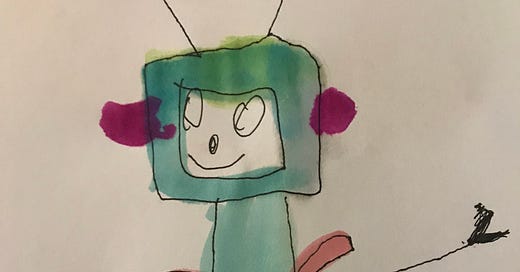Every technology challenges our human values which is a good thing because it causes us to reflect on what these values are.
—Sherry Turkle
Before my detour into intensive dog care last week, I was focusing on some recent events in AI. One stood out in particular because it involved reflecting on new technology and human values. MIT held an event in December 2023 with the title Generative AI+ Education featuring several panels. I found my way initially to the panel “Will Generative AI Transform Learning and Education?” featuring Mitch Resnick, the LEGO Papert Professor of Learning Research at MIT, and Justin Reich, Director of the MIT Teaching Systems Lab, moderated by Philipp Schmidt, former Director of Digital Learning and Collaboration at the MIT Media Lab.
If you are familiar with Scratch, you might be familiar with Mitch Resnick—his Lifelong Kindergarten research group developed the Scratch programming software. Sir Ken Robinson wrote the foreword to Resnick’s book, Lifelong Kindergarten: Cultivating Creativity through Project, Passion, Peers, and Play. I have followed Resnick’s work for many years and was profoundly inspired by his mentor, Seymour Papert. So I was excited to hear how Resnick framed the Generative AI + Education discussion on the panel.
Here’s an excerpt:
“I do think that there have been these waves of technologies that ripple through society and each time there's a new wave of technology, I think we always need to consider how are we going to integrate this into our learning environments, how is it going to affect learning and education. This happened 40-50 years ago as personal computers spread through society. It happened 25 years ago as the internet became prevalent through society, and it’s happening now with AI and generative AI.
“I do think each time we have to think about how is it that this could be integrated. I think there are important choices to make. It's not something that is automatic that’s going to happen. To me it's really important to consider each time what type of learning and education do we want for our children, for our schools, for our society. I think that can really guide us and I think too often people don't go back to that basic framework. They think: What can the technology do? as opposed to what we want for learning and education for children, for schools, for society.”
The whole panel is 43 minutes long but if you are short on time, watch the Past Waves section of the video starting here. Mitch Resnick has mentored some of the most creative young graduate students I’ve encountered. This is an important talk that can help us think more deeply about generative AI and education.
From the Mindful Digital Life archives
Who is Seymour Papert (and why does it matter)?? This post, written in February, 2019, will give you some backstory on topics Mitch Resnick explores on the MIT panel—Seymour Papert, Scratch, growing up with AI. And you’ll meet some of Resnick’s grad students and see the creative work they’re doing with AI for kids.
Streaming this week until July 9—don’t miss it
In April, 2018, I sat down with Justine Toms, co-founder and executive director of New Dimensions, for an interview to discuss living mindfully with digital technology. The conversation is streaming through July 9 here on the New Dimensions website. I talk a lot about the importance of what I call “co-creative conversation” with the young people in our lives—about our human values, and about the digital tools we are using in our daily lives—a subject all the more essential with the rapid influx of generative AI into our lives. Justine Toms asks some beautiful questions. Thanks to New Dimensions for surfacing it for us again. I hope you’ll give it a listen.
Elsewhere on Substack
I’ve said before, identifying people doing innovative work with young people and AI is essential for our own growth and creativity as parents, grandparents, caregivers, education leaders. I noticed this past week that Jordan Shapiro has a newsletter on Substack. Shapiro is a research fellow at the Joan Ganz Cooney Center, and author of Father Figure and The New Childhood: Raising Kids to Thrive in a Connected World. I’ve appreciated Shapiro’s work for quite a few years now (for example, see his guide Digital play for global citizens).
His first Substack post is titled A College Assignment for the A.I. Era - or, how I learned to stop worrying and love the robots.
Here’s the intro:
Every college professor I know is complaining about students using artificial intelligence to complete their work. Students ask A.I. to summarize the readings, write comments and contributions for class discussions, and of course, to write their papers. For my online summer course, I thought it might be helpful to have students start the semester by considering the implications and limitations of artificial intelligence.
Shapiro gives his students a unique assignment and shares all the details with you, including his conversation with Perplexity AI. Read it. It’s excellent.
Thank you to the many readers who wrote following last week’s post—sweet old dog is doing much better. I am grateful for a good veterinarian.
Be well. Thank you for your curiosity and making time to read The Interconnect. I’m glad you’ve found your way here and I hope you stay a while. Please consider sharing this post with family, friends, teachers, and/or colleagues who might appreciate it and put it to work.




